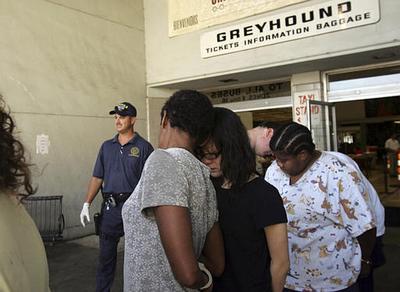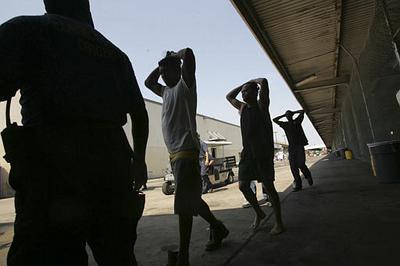
A line of women in custody line up at a makeshift jail facility at the Union Passenger Terminal in New Orleans, Friday, Sept. 9. The temporary holding facility holds those accused of a crime before they are sent to an operating jail. [Times Picayune caption dated September 10]

A line of men in custody line up after arriving from Jefferson Parish at a makeshift jail facility at the Union Passenger Terminal in New Orleans, Friday. The temporary facility holds those accused of a crime before being sent to an operating jail. [Times Picayune caption dated September 10]
A third letter from Jordan Flaherty:
Mourning For New Orleans
by Jordan Flaherty
Its been six days since I left New Orleans, and I miss
my home so much. Im still in a daze, its hard to
hold a conversation or to think straight. People ask
if everyone I know is ok, and I dont know what to
say. There are so many stories, so many rumors, so
many people dispersed around the US. So many of us
may never see each other again. I dont think any of
us are ok right now.One friend, a teacher, was searching the Astrodome
while holding up a sign, looking for his former
students. Another friend says she fears shell never
see New Orleans or her friends from there again.
Another friend found temporary comfort with family in
Houston and then got kicked out. A lot of friends are
working in shelters, providing assistance, medical
care, whatever they can. We are already spread across
so many states, trying to pick up the pieces of our
lives.I can think of at least thirty people that I have no
idea where they are. In some cities it seems like
when people meet they give out their email address or
weblog or friendster or whatever. In New Orleans, a
lot of us only know each other only by first names.
There are so many people I would see at least once a
week that I dont know how to get in touch with at
all. Even cel phones from the New Orleans area code
have been nonfunctioning for most of the last two
weeks.New Orleans is a word of mouth town. The way you
would find out about parties, secondlines, jazz
funerals and other events is from hearing about it
from friends. I always liked that about New Orleans.
In an increasingly disconnected world, New Orleans
felt different, more real and concrete. Now that
we arent seeing each other regularly, our elaborate
communication network has broken down.But when people ask I just say, yes, as far as I know
everyone is ok. I cant really bring myself to think
about it further than that.Those with the least to begin with are the ones we
worry about most now. Families and Friends of
Louisianas Incarcerated Children is a grassroots
organization with a long history of fighting for New
Orleans most vulnerable. Since hurricane Katrina,
they have been on the front lines of relief,
spending time in the shelters, helping advocate for
the refugees of New Orleans, and trying to find out
what happened to both adults and children who were
locked up while New Orleans flooded.There has been a lot of media hysteria regarding those
who were locked in New Orleans prisons during the
hurricane, stories that make it sound like a Hollywood
action film where murderers use a disaster to escape
and wreck havoc.This is exactly wrong. The truth is that tales from
the imprisoned population of New Orleans are among the
most heartbreaking stories of the past week.Families are still looking for loved ones lost in the
system. According to organizers with FFLIC, of
approximately 240 kids in state custody, as of a
couple of days ago only 6 or 7 parents had been able
to track down their children.According to statistics compiled by the Juvenile
Justice Project of Louisiana, at least 78% of New
Orleans incarcerated youth were locked up for
nonviolent offenses. The detention center in Jefferson
Parish reports that 96% of the youth held there in
2000 were for nonviolent offenses. At least a third
of youth in prison have been sentenced to three or
more years for nonviolent offenses. In New
Orleans, 95% of the detained youth in 1999 were
African-American. Louisiana taxpayers spend
$96,713 to incarcerate a single child, and $4,724 to
educate a child in the public schools.According to a report by Human Rights Watch, the
state of Louisiana has one of the highest rates in
the country of children living in poverty and children
not in school or working. Large numbers of children,
especially black children, are suspended from school
each year, sometimes for the whole year. Approximately
1,500 Louisiana children are confined in secure
correctional facilities each year...In response to the
question,"what would you most like to change here?",
virtually every child at all of the facilities
responded that they would like the guards to stop
hitting them and that they would like more food.
Children consistently told us that they were hungry.Some people have been hurt to hear people of New
Orleans called refugees. This hurts me too, but it
hurts me more to feel that we have been treated as
refugees. In a way, the people of New Orleans were
refugees before hurricane Katrina ever came. We were
abandoned by a country that never needed us, unless they needed a cheap vacation of strip clubs and binge drinking and
cheap live music.One of the things I love about New Orleans is that it
always feels like another country. Now we see that in
the eyes of the federal government we truly are
residents of another country. A poor, black country.
Instead of insisting that the displaced of New Orleans
are not refugees, we should use this as an opportunity
to look at why the idea of US refugees is so
discomforting.The transformation of the people of New Orleans into
refugees is a large part of what has captured the
imagination of people from around the world,
especially those who are refugees themselves. Ive
received emails from Ghana and Cuba and Peru and
Lebanon and Palestine. In New York City tonight, a
group of artists, initiated by Def Poetry Jam star and
Palestinian poet Suheir Hammad, organized a benefit
called Refugees For Refugees. That title beautifully
and poignantly captures the feelings this man-made
tragedy has generated around the world.In her most recent poem, "On Refuge and Language",
Suheir writes:
I do not wish
To place words in living mouths
Or bury the dead dishonorablyI am not deaf to cries escaping shelters
That citizens are not refugees
Refugees are not AmericansI will not use language
One way or another
To accommodate my comfortI will not look away
All I know is this
No peoples ever choose to claim status of dispossessed
No peoples want pity above compassion
No enslaved peoples ever called themselves slavesWhat do we pledge allegiance to?
A government that leaves its old
To die of thirst surrounded by water
Is a foreign governmentPeople who are streaming
Illiterate into paperwork
Have long ago been abandonedI think of coded language
And all that words carry on their backsI think of how it is always the poor
Who are tagged and boxed with labels
Not of their own choosingI think of my grandparents
And how some called them refugees
Others called them non-existent
They called themselves landless
Which means homelessBefore the hurricane
No tents were prepared for the fleeing
Because Americans do not live in tents
Tents are for Haiti for Bosnia for RwandaRefugees are the rest of the world
Those left to defend their human decency
Against conditions the rich keep their animals from
Those who have too many children
Those who always have open hands and empty bellies
Those whose numbers are massive
Those who seek refuge
From natures currents and man's resourcesThose who are forgotten in the mean times
Those who remember
Ahmad from Guinea makes my falafel sandwich and says
So this is your countryYes Amadou this my country
And these my peopleEvacuated as if criminal
Rescued by neighbors
Shot by soldiersAdamant they belong
The rest of the world can now see
What I have seenDo not look away
The rest of the world lives here too
In America
[images by Lisa Krantz from AP via Times Picayune]